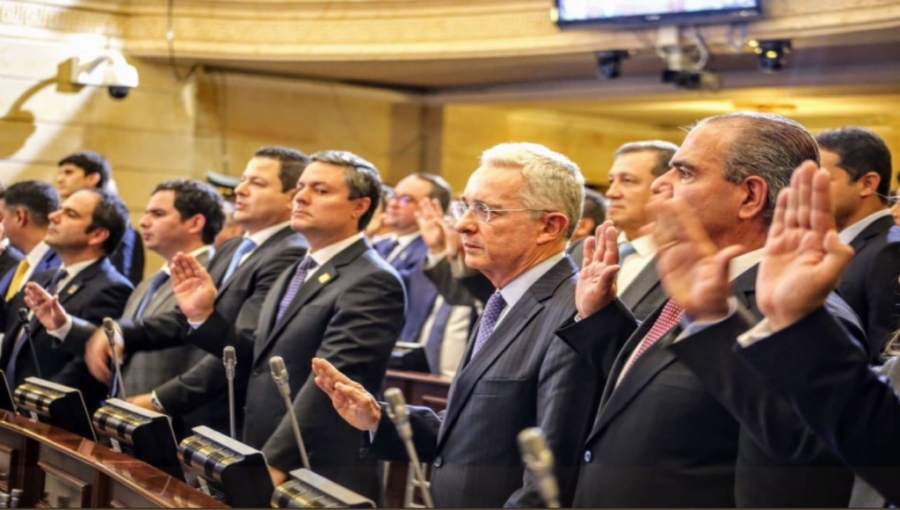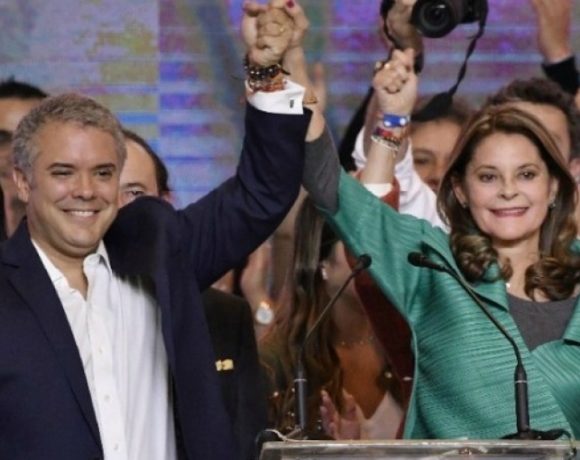Colombia Supreme Court Orders House Arrest Pending Trial for Former President Alvaro Uribe

An investigative unit (“Sala de Instruccion”) of the Colombia Supreme Court on August 4 ordered preventive house detention against former Colombia President (now Senator) Alvaro Uribe on charges of witness tampering in a case involving Colombia’s never-ending political cannibalism.
Ironically, the alleged victim of witness tampering – left-wing Senator Iván Cepeda of the Polo Democratic Party – was himself alleged to be involved in witness tampering in a Machiavellian scheme aiming to get criminals put in prison by former President Uribe to make outrageous allegations of Uribe’s supposed involvement in paramilitary crimes decades ago.
Reacting to the Supreme Court detention order against Uribe, Senator Cepeda stated via his Twitter account: “The lesson this decision gives us is that there are no people in Colombia who are above justice and the law, however powerful and influential they are.”
Given decades-long, internecine political wars and narco-terrorist schemes that tragically have corrupted and damaged nearly every sector of Colombian society — including the justice system – the Cepeda claim that no-one is above justice here is not only ironic but sadly risible.
Just one example: FARC leaders and thousands of its members and accomplices have won complete impunity for horrific crimes – murders, kidnappings, extorsions and narco-trafficking — as a result of Colombia’s deeply flawed “peace” treaty. Several of these criminals now have seats in the Colombia Congress – achieved not by popular vote but rather given to them by terms of that same peace treaty.
What’s more, the same Supreme Court that just ordered Uribe’s arrest is also the Court that recently set free convicted FARC narco-terrorist Jesus Santrich, now a guest of the narco-communist Venezuelan dictatorship that has long supported FARC.
Commenting on this latest irony, former Colombia Justice Vice-Minister Rafael Nieto Loaiza stated via his Twitter account that “the same Supreme Court that released Santrich deprives Alvaro Uribe Velez of liberty. It would prove, once again, that our criminal justice is politicized. And it would show that we are a failed state that rewards bandits and persecutes those who fight them.”
Diego Cadena — one of Uribe’s lawyers investigating jailed criminals who are trying to take revenge against Uribe by alleging Uribe involvement in paramilitary crimes – also now faces charges of witness tampering. Cadena has publicly stated that Uribe was unaware of his attempts to convince some of those criminals to retract their allegedly false accusations against Uribe — testimony that the Supreme Court so far has ignored.
Yet another irony in the case is that both Uribe and Senator Cepeda are the sons of fathers murdered in Colombia’s horrific, decades-long wars of terror and revenge.
President Uribe’s father was murdered by the narco-communist FARC army, while Senator Cepeda’s father – a member of the FARC’s now-extinct “Union Patriotica” political wing – was murdered by unknown bandits believed to be linked to paramilitary forces.
Uribe – a long-time member of Colombia’s social-democratic Liberal Party — was Colombia’s most-popular president in all history, with more-than-70% favorability rankings. He later became the Colombian Senator who won the most popular votes in all Senate electoral history.
According to Colombia’s Defense Ministry, during Uribe’s eight years as President (2002 to 2010), extradition of narcos to the U.S. rose 546%, murders of mayors (typically carried-out by FARC terrorists) fell 67%, murders of labor union leaders fell 84% and murders of teachers-union militants fell 78%.
Murders of journalists fell 90%, kidnappings (typically by FARC and ELN terrorists) fell 90%, mass-kidnappings fell 100%, coca plantation acreage fell 44%, cocaine seizures rose 64% and mayors forced to leave their towns by FARC terrorists fell 100%, according to the Defense Ministry.
However, along the way, Uribe gained ferocious enemies — not only from FARC and ELN, but also from paramilitaries, narco-gangsters of every stripe, and rival politicians.
Having survived numerous assassination attempts – including a FARC mortar attack on the Presidential Palace during his first inauguration, and another FARC bomb attack against his plane coming in for an airport landing – Uribe became Colombia’s most beloved politician, by the vast majority.
But Uribe simultaneously earned hatred not only from the extreme left wing but also from political rivals, including former President Juan Manuel Santos, architect of the “peace” treaty with the FARC that Uribe denounced as a betrayal.
Uribe’s intemperate character occasionally led him to accuse rivals of being fools, political hacks, or, in some cases, fellow-travelers of those seeking to impose a Communist dictatorship in Colombia.
For example: In 2009, then-President Uribe verbally attacked a Supreme Court decision to choose an Attorney General who lacked experience in criminal law but instead seemed to be favored by political manuevering. Uribe publicly accused the Court of “historical hypocrisy of introducing politicking to the management of justice,” which provoked reprimands from leaders of rival political parties and the Court itself.
President Duque Laments Court Decision
Following release of the Supreme Court order against Uribe, current Colombian President Ivan Duque – a member of the same Centro Democratico Party founded by Uribe – lamented the decision.
“Throughout my life I have had the honor of meeting, treating, working and building a friendship with Álvaro Uribe Vélez. I have always considered him and will consider him a genuine patriot, dedicated to serving Colombia, as evidenced in a long career of public service as director of Aerocivil, Mayor of Medellín, Senator, Governor [of Antioquia] and as President of Colombia on two occasions,” President Duque said.
“During his two [presidential terms], our country regained security [and] Colombia put itself in the eye of investment, and progress was made in social justice. With a sense of legality, Álvaro Uribe confronted drug trafficking, terrorism and totalitarian regimes in Latin America.
“As a result of his struggle, he and his family have been victims of all kinds of attacks and defamation, all kinds of epithets, and all kinds of accusations.
“It hurts as a Colombian that many of those who have lacerated the country with barbarism [now] defend themselves in freedom or, even, are guaranteed never to go to prison, and that an exemplary public servant, who has held the highest dignity of the State, is not allowed to defend himself in freedom, with the presumption of innocence.
“As President, I call for reflection. I understand the role of institutions and the independence of powers. As a citizen and believer in the institutions, I hope that the judicial channels will operate, and that there are full guarantees so that an upright human being can fully exercise his defense in freedom,” Duque said.
















